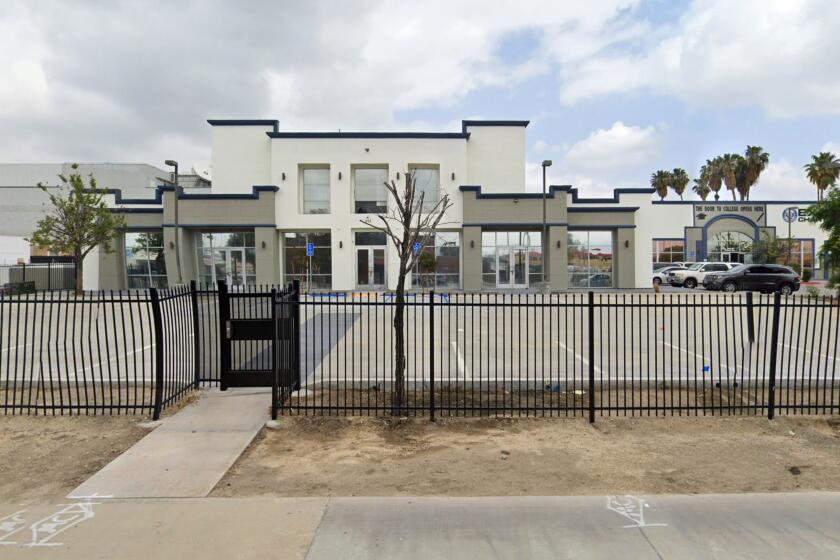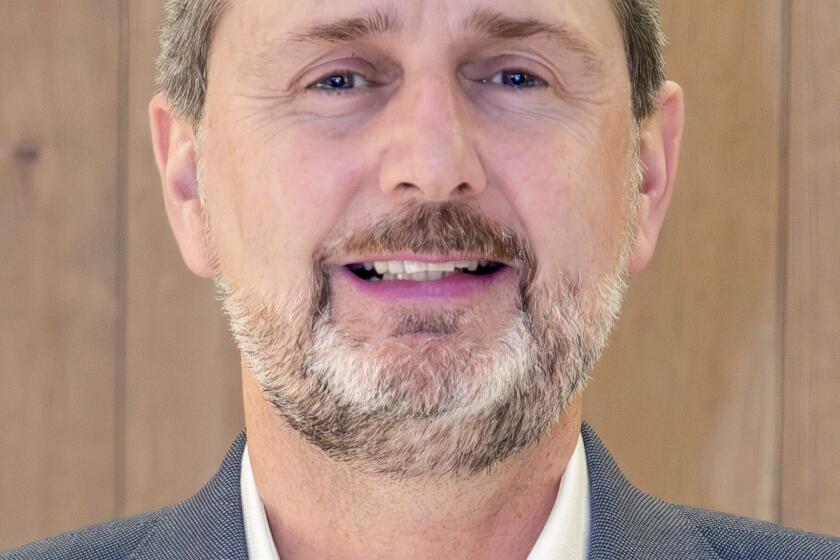Before His Trial, Blake Saw Stars as a Defense Tactic
Locked up while awaiting trial on charges that he killed his wife, Robert Blake, star of ABC’s “Baretta,” brainstormed with his publicist, Dale Olson, about other 1970s TV stars they could enlist to rally to his side.
Like Gavin McLeod, captain of “The Love Boat.”
“He’s perfect,” Blake told Olson. Blake wasn’t impressed when Scott Baio of “Happy Days” requested a jailhouse visit: “Tell him to send me a letter.”
But of Suzanne Pleshette, who played the psychologist’s wife on “The Bob Newhart Show,” Blake declared: “The whole world loves her.”
If Pleshette couldn’t make it to the jail, Blake had an understudy in mind: “The girl that played ‘The Bionic Woman’ ... Lands -- Lindsey Wagner.
“It should be one person after the other. You call another one and say, ‘Would you come to the courthouse with us one time ... and afterward go out and talk to the public?’ ”
Blake’s comments were recorded, and tapes and transcripts were obtained by The Times. The conversations, which took place in the visiting room of Men’s Central Jail in downtown Los Angeles, were taped by the Los Angeles County Sheriff’s Department over the 11 months, spanning 2002 and 2003, that Blake spent in the jail after being charged with the murder of his wife, Bonny Lee Bakley.
Many of the conversations are with Olson; others are with friends or with unidentified people.
Taping jailhouse visits is a standard practice at the jail, and signs alerting inmates to the policy are posted in the visiting room.
As it turned out, none of these actors jumped on board Blake’s Nick-at-Nite defense plan. In March, Blake was acquitted.
Blake, 71, is to be questioned under oath today in a deposition in Irvine in a wrongful-death suit filed by Bakley’s family.
However, about 20 celebrities, including actors Anthony Hopkins and Wilford Brimley and comedian Mort Sahl, did make the pilgrimage to court or to the jail, Olson said.
“We never used them as media coverage,” Olson said in a phone interview last week.
“The whole idea was to make Robert know that there were people -- colleagues he had, peers -- who were supporting him and continuing to be his friends,” he added.
Actress Sally Kirkland said she visited Blake as a friend and in her capacity as a minister for the Los Angeles-based Church of the Movement of Spiritual Inner Awareness.
Kirkland said the “Baretta” star was “beyond lonely.”
“He does know very famous people, and a lot of them wanted to help,” Kirkland said.
“People can look at that cynically, but it was very legitimate,” she added.
Wagner’s manager, Joel Brokaw, said she was not contacted by the Blake camp and didn’t visit the actor in jail, although she has been friendly with him since their days at Universal.
Representatives for Pleshette and Baio declined to comment. McLeod could not be reached.
Blake’s criminal lawyer, M. Gerald Schwartzbach, said his client, an actor since he was 3, approached his case from the point of view of the only world he had ever known.
“It reflects the views of somebody whose entire life experience and perspective is within the entertainment industry,” Schwartzbach said.
Attorney Eric Dubin, who represents the Bakley family in their wrongful-death lawsuit, described the tapes as “a grotesque blueprint for victim-bashing, designed to taint the jury pool and fool the public.”
Dubin cited the tapes in arguing Friday against a request by Blake’s attorney for a gag order in the civil trial.
Judge David M. Schacter denied the request and refused to seal records.
Blake’s civil attorney, Peter Q. Ezzell, said he could not discuss the contents of the tapes.
Deputy Dist. Atty. Shellie L. Samuels, who prosecuted the criminal case, also refused to do so.
It’s not clear how Blake thought assembling the roster of celebrities would help influence prospective jurors.
But Blake didn’t think much of jurors.
“Anybody who has a job they care about ... anybody who has a life that they care about, anybody who has a wife they care about, they just don’t get on juries,” he told an unidentified man, according to a transcript of one of the tapes.
“And the ones who stay are usually about 85 IQ and, you know, when Johnnie Cochran stands up there and says, ‘If it doesn’t fit, you must acquit.’ And we all thought he was a ... idiot. But the jury digs that because they’re the people that go bowling.”
“This is ancient history,” Schwartzbach said in dismissing Blake’s comments about jurors. “Nothing he said that I’m aware of had anything to do with guilt or innocence or with the defense that was prepared by me.”
In his publicity campaign, Blake did not neglect the news media.
In another tape transcript, also during a jailhouse visit with Olson, he complained that his then-lawyer, Harland Braun, decided to talk with “Today Show” host Katie Couric instead of Diane Sawyer of “Good Morning America.”
Blake, however, said he was happy he himself chose Sawyer’s colleague, Barbara Walters, for his own on-camera interview.
Braun later quit the case because he disagreed with Blake’s decision to give Walters the 2003 jailhouse interview. The Walters interview tape was played for the jury, and Blake thanked her after his acquittal.
Associated Press reporter Linda Deutsch was “terrific,” Blake said, but “nobody reads newspapers.”
At another point, Blake discusses an upcoming phone interview for CNN’s “Larry King Live.” Blake proposes a surprise call to his toddler daughter, Rosie, who is also the child of his slain wife, during the interview.
“I will get on the phone and talk to Rosie, and Larry King will have a hook-up so that everybody in America can hear me talk to Rosie,” Blake said, according to a transcript of the conversation.
But he also warned his publicist, “Don’t let it look like a performance.”
“If I do well with Rosie, it will be a radio spot on every radio in America,” he said.
King conducted an off-camera jailhouse interview with Blake in 2002, but it did not feature a call to his daughter.
According to another transcript, Blake was resigned to the possibility of a jury not liking him and sending him to prison, which he labeled a “bad location job.”
“Where it goes, I mean, if I end up in some prison space because the jury doesn’t like me, I don’t give a [expletive]....I’ll write my memoirs.” Blake told an unidentified woman, according to the transcript.
“Like I said, Charlie Manson has a website and makes money. So it ain’t the end of the [expletive] world.”
*
Times staff writer Jean Guccione contributed to this report.
More to Read
Start your day right
Sign up for Essential California for news, features and recommendations from the L.A. Times and beyond in your inbox six days a week.
You may occasionally receive promotional content from the Los Angeles Times.






